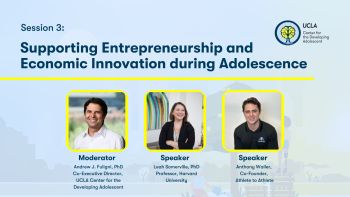(Photo: Gift Habeshaw)
It might seem like a paradox, but successfully transitioning to being an independent adult requires support from and close connections with peers and trusted adults. Our brilliant Digital Communications Intern Allyson Nesmith writes about the importance of this support as she approaches college graduation.
If there is anything I have learned in my 22 years of life so far, it’s that moving on to the “next chapter” can feel simultaneously exciting and intimidating. Throughout adolescence, there are many of these moments, including the transition from middle to high school, the day you start driving, having your first crush, and leaving high school to go to college. There is also the major transition from college to adulthood, which is the “next chapter” moment I am currently experiencing.
While graduating college is exciting (a future of no exams, discussion posts, or long winded essays is very appealing), there are many things I am uncertain about. Where do I want to live? Do I want to move back home, or do I want to live in a new state? What do I want to do for my career? What are taxes and how do I do them? How do I learn to cook for myself, or how much to budget for groceries? The questions of adulthood are endless, and for the longest time, I believed I was the only person in the world who had them.
I could not have been more wrong.
I spoke with a Vanderbilt alumni a few weeks ago, and she shared with me that upon her graduation, she didn’t have a full time job lined up, or know where she wanted to live. She told me that (during that time) she was scared, that being scared was okay, and that even in the face of uncertainty, she was confident that things would work out with time.
It turns out that that was exactly what I needed to hear. I needed to hear an adult tell me directly that it was okay to not have everything figured out. I needed an adult to reassure me that things were going to work themselves out, and that even if it took time, it would be okay. I needed an adult to remind me that everybody’s life paths will look different, and that is perfectly normal. My feelings of uncertainty were actually more common than I thought!
In addition to receiving support from adults, I also began to notice the ways in which adolescents (in particular, college students) worked through these feelings of uncertainty together. Young people are constantly leaning on one another to ask for advice, inspiration, and support. For example, there are many alumni who lead career panels for graduating seniors, and even send us emails about various job opportunities. Pre-med majors send each other recommendations for getting their shadowing hours, and law school students study together in preparation for the LSAT. Student led organizations host cooking classes, webinars about insurance, and budgeting 101 courses (to name a few), in order to spread as much knowledge as possible with other young people.
From observing my surroundings, I saw firsthand the ways in which adolescents are resilient, especially when faced with uncertainty. Through creativity, compassion, and the help of trusted adults, young people carry one another through these uncertain times. I also realized that contrary to how things may seem, you are never truly alone in your feelings!



